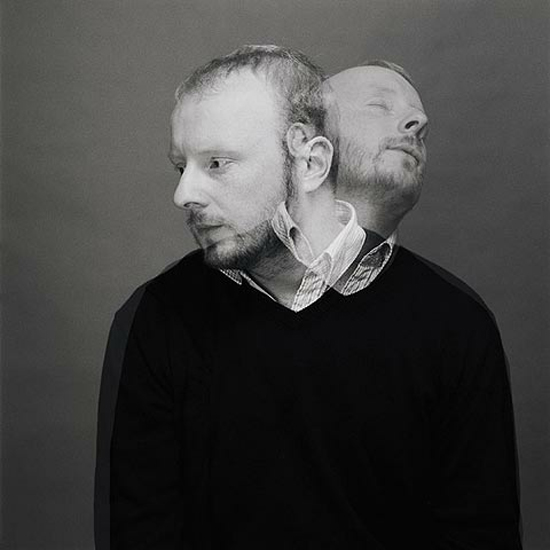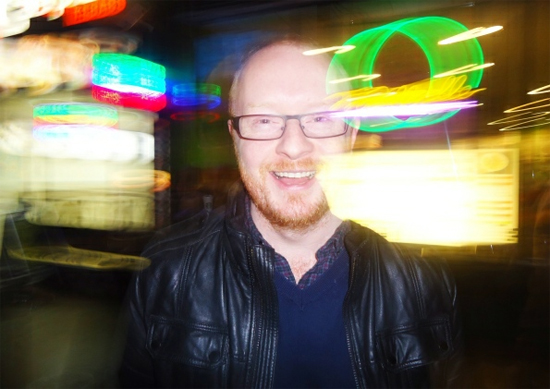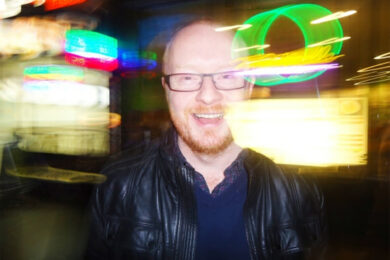The Isle of Eigg, population 70, a late-summer Saturday afternoon in 2010. By the end of the night British Sea Power will bring down a tree-propped gig marquee, and we’re all still lurching after a stormy, death-defying ferry crossing. Right now though, all we care about is Falkirk alt-pop bard and former Arab Strap melodist Malcolm Middleton, who is sat under canvas, plaid and a trucker hat, unveiling an ace, hangover-sating guitar-based endeavour. He calls it Human Don’t Be Angry.
A month after this debut performance at the Fence Collective’s brilliant Away Game, Middleton lays down "three unbreakable rules" for his alter-ego, Human Don’t Be Angry:
1) Act like you know what you’re doing.
2) No beer onstage.
3) Absolutely no interviews.
What follows is the product of three subsequent interviews.
Did that Eigg show play a key part in the birth of Human Don’t Be Angry?
MM: Yeah, that’s what sort of started it off. Johnny [Lynch aka The Pictish Trail] asked me to play the Away Game and I said, ‘Yeah, but can I do it under another name?’ I wanted to do something different and it felt like having a disguise that way. Even though everyone knew it was me, I was able to fool myself. Human Don’t Be Angry gave me an open playing field and brought about a sense of musical freedom which I hadn’t felt for years. I think the original plan was for 40 minutes’ hardcore ambient noise.
So I let it go for months and then I went, ‘Shit, it’s happening in four weeks – I need a name, I need some songs.’ And after doing nothing in terms of writing that year, I wrote most of the HDBA album in four weeks.
I had this idea that Human Don’t Be Angry was going to be this obtuse, experimental, really minimal thing with like 10, 15 minutes per song – no lyrics, no trying to express myself, just this piece of music. But when I tried to do that, I felt like I was ripping people off. I don’t know a huge amount about avant-garde music or experimental music, and that pop aspect always comes out. I want a tune. I want a chorus.
Pop has played a cardinal role in the musical life of Middleton. The first concert he ever attended was T’Pau (with Bryan Adams) at Glasgow SECC; he wanted his 2009 album Waxing Gibbous to sound like Ladyhawke ("but it ended up a bit moany"); he has an abiding love for Pat Benatar. He’s covered Girls Aloud’s superlative hit, ‘Call The Shots’, he "only bought a loop pedal and started doing Human Don’t Be Angry stuff" after seeing KT Tunstall on Later with Jools Holland, and his amazing in-car sounds include Paul Young, Taylor Dayne and Boy Meets Girl. He is keen to have Take That cover one of his songs.
People always seem weirdly surprised when you or Aidan Moffat talk about loving mainstream pop music – say if Aidan tweets about Cher Lloyd, or when you reminisce about Madonna. Could Arab Strap have been a pop band in a parallel realm?
MM: I think Arab Strap were victims of our time. Me and Aidan had always grown up listening to really accessible music, but the actual climate we came out in was all lo-fi and American, stuff like Smog. That’s why we sounded like we did. If we had come out ten years earlier we’d probably have been this massive pop band, suits on and all that. [laughs]
Sort of like the anti-Hue & Cry?
MM: Haha, yeah. We came out with the right attitude and music, but at the wrong time.
Do you think that pop imperative also means you sing, despite yourself? Even through you originally wanted HDBA to be instrumental, and claimed as much onstage on Eigg, you ‘backed down’ and did some looped-vocal numbers shortly thereafter.
MM: Yeah, the plan with HDBA was that the guitars would come first and the words would come second, if at all. So I had these nice guitar parts for ‘Monologue: River’, but then I just started going – ‘Hmmmm’ [he engages in some ambient falsetto crooning and laughs] – over the top of it, which I never do, I usually have the words first. And it’s a really bad line, ‘I’m gonna roll down the river,’ but then I thought, it doesn’t matter what it means, it’s just a voice going with the music.
After the Eigg show, Middleton offers a few thoughts on what direction the nascent HDBA project may take.
MM: Drums and synths might come later. I’d maybe like to have other musicians join me at some point. I want to see how the songs develop live and then record something.

A Russian Café, Glasgow, December 2011. One year on, and HDBA has assumed a glorious, evolving life of its own, with a live band, drums and synths in tow. Middleton has toured with bygone Arab Strap co-conspirator Aidan Moffat ["it was the exact opposite of The Trip"], released an ace HDBA live album, Live at Leeds, started recording a studio HDBA long-player, and reunited Arab Strap for one night only in Glasgow. ["I actually felt like I enjoyed it too much"].
What would you have done if Chemikal Underground hadn’t put out the first Arab Strap album in 1996? Would you have released it yourselves? Did you feel a burning need to have your music heard?
MM: I’d probably still be working as a waiter on the Isle of Mull. I really don’t know if we’d have put the record out ourselves. The plan was I was away working to make money to buy a proper four-track and I’d come back in October but I lasted five weeks before I got a phone-call from Aidan saying, ‘We’ve made it! [smiles, shakes head.]
It’s the things you get first – the smaller things – that matter. I still remember the feeling of my first-ever gig, when Rabid Lettuce played the Claremont Inn in Polmont. I thought I’d made it. We were supporting a band doing Wonder Stuff covers. It was that bad time when everyone wore three-quarter length shorts, I think I was 17. I had my first-ever kebab that night. I remember thinking, ‘This is it. This is what I want.’
You’ve described your first band, Rabid Lettuce, as fusing Ned’s Atomic Dustbin with Napalm Death, and you’ve hinted that the new HDBA album is "a cross between Jan Hammer and Iron Maiden." Where do Maiden, and metal, fit into your music?
MM: The thing about Iron Maiden is that I have problems defending them because I love them, but there are bits that I hate. You have to understand what you’re listening to, and what you’re going to watch. You need to know the rules of the game, and you need know that the songs might be about wizards.
I started listening to metal when I was 14, and that’s when you wouldn’t tell anyone. Then your hair would get longer, and you’d get patches on your jacket, and then suddenly you’d come out of the metal closet.
I started playing guitar later, so I never actually learned how to play heavy metal guitar, it was more The Pixies and stuff. Although when I took my sabbatical two years ago, after the last tour [for 2009’s Waxing Gibbous, after which Middleton announced he was retiring for a while], I just sat for the first month learning Black Sabbath songs at home – I don’t know why, but I had to get it out of my system. I had some crazy idea about doing an acoustic Black Sabbath tribute for a while, but then I realised I wouldn’t want to see that myself, so why would anyone else? [laughs]
Do you think having a teenage heavy metal phase is like a rite of passage?
MM: I have this thing, it’s like a snobbery. I just don’t trust people that haven’t been through it. Aidan hasn’t been through it. He never listened to heavy metal. He was listening to Talking Heads.
Was it weird, or liberating, becoming a frontman when you went solo after Arab Strap?
MM: It felt natural at the time. I still don’t classify myself as a singer, but then I still don’t see myself as a songwriter either, and then I realise I’ve written quite a lot of songs. I think I still see myself as a guitarist.
It’s not something I ever really aimed to do, although I do like singing songs, I like recording songs and I like playing live sometimes. But usually when I enjoy playing live I beat myself up afterwards. There’s this internal monologue where I think, ‘Why did you enjoy that? Were you standing at the front of the stage trying to be cool or something?’ [He shakes his head and laughs quietly into his borscht]. ‘You think you’re Bono, aye?’
But you still make music collaboratively too – you’re working with Mira Calix, is that right?
MM: Yeah, we’re doing an album together. We recorded a session for Radio 3’s Late Junction a few years ago – she was asked to choose someone to collaborate with and she picked me, I think she saw me play with Mogwai once. She’s amazing. We’ve been sending each other stuff up and down for the past couple of years, and it’s completely different to anything else that I’ve done. I’ll give her parts of a song and she’ll destroy it and then she’ll send me some stuff and I try and sculpt it into a song. I kind of more wanted that to be instrumental as well, but she kept going, ‘Put some words on them… we’ll both sing bits.’
Do you find you write lyrics differently, or from a different perspective, when they’re going to be sung by someone else?
MM: Um… no. It’s pretty much just the usual, what do you call it. Self-absorbed shite.
A country estate in rural Fife, April 2012, and the debut self-titled Human Don’t Be Angry studio album has been released via Chemikal Underground. Middleton has since relocated from Glasgow to the East Neuk and his cottage is surrounded by chickens, pheasants, sheep, trees and farmland as far as the eye can see. The nearest shop and pub are miles away, although the latter does boast an imminent show by The World’s Greatest Clapton Tribute.
Perhaps you could get into some sort of guitar duel at the Clapton tribute?
MM: I don’t think so. Do you want a jubilee cake?
He makes us tea.
Thanks. There are loads of 80s pop-cultural references on the HDBA album – Frankie Goes To Hollywood (‘After the Pleasuredome’), Back To the Future (‘The Missing Plutonium’) and, indirectly, Live Aid and Madonna on ‘1985’. Was that a landmark year?
MM: I was happy in 1985. I thought Madonna and Pat [Benatar] were on the horizon. I think 1985 was also the year my childhood cracked. I remember staying up late all summer with a feeling of confusion, which I think everyone goes through, where you suddenly realise you’re a person and there’s a huge universe out there – the faint sound of a bubble bursting. Shit like that.
First Person Singular, Present Tense is a reference to English writer and mystic Douglas Harding’s doctrine, On Having No Head, is that right?
MM: Yeah, I didn’t really like the book, but I liked that line. I liked that more than I liked the idea of having no head, just because you can’t see it. So the line was inspired by the book, and the song was inspired by the title, but the song is not about the book. I get what he’s saying, that you can’t see your head without a mirror, but that’s it.
Harding was inspired by Ernst Mach’s revelatory self-portrait, which he drew from a first-person perspective, looking down on himself – legs, arms, shoulders, but no head – and I kind of get his point in that respect. Have you done any of Harding’s ‘Headless Experiments’? Have you tried ‘Two-Way Pointing?’
MM: I haven’t tried any of the experiments. Um, have you been getting really into this?
I demonstrate the procedure known as Two-Way Pointing.
Okay. Point at an object with one hand. Now point at your face – sorry, Harding calls it your "No-face" – with the other.
I point outward into the living room and am immediately distracted by what appears to be a miniature effigy of Middleton, in a snow-globe, on his mantelpiece.
If you point outwardly to, say, the arm of your chair there, or that window pane, you see barriers. They’re mental blockages. Whereas when I point back at my "No-face" here, to the space where my head should be, that’s infinite. You see? I’m pointing at an "impeccable void". My knowledge and opportunities are boundless.
Middleton seems unimpressed.
What do you have – a face, or a space? That’s the ultimate ‘Headless’ question.
Silence.
MM: It doesn’t work if you’re wearing glasses. [He pushes up his glasses]. You can see the glasses sitting there. You always know you’ve got a head.
Harding famously observed that he had lost a head and gained a world. Middleton’s head remains firmly screwed on, but in evading his name and solo identity – for now at least – he has gained a new widescreen pop universe in Human Don’t Be Angry. Lest it require pointing out, it sounds bloody marvellous too.
Human Don’t Be Angry by Human Don’t Be Angry and new single ‘1985’ are out now on Chemikal Underground. HDBA plays London’s Cargo tonight then tours.



